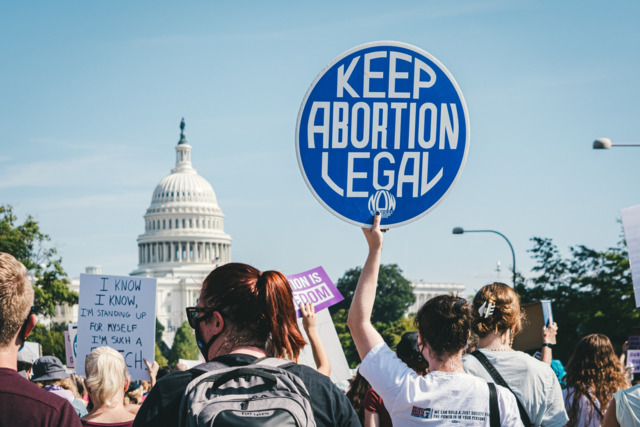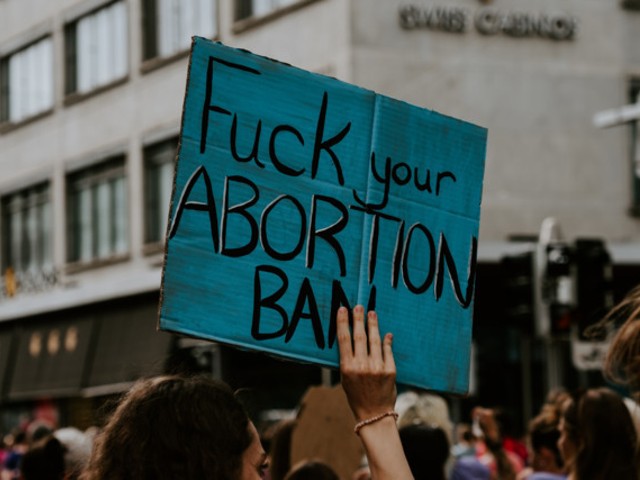
A Mason anti-abortion ordinance is on hold as a petition against it is being reviewed.
After attempting to ban abortion within the city limits in previous council meetings, Mason City Council finally went through with it in October. During an Oct. 25 meeting, council
members voted 4-3 to outlaw abortion at all gestational stages within Mason's city limits and punish those who "aid and abet" abortions through funding, transportation and more. Violators could be fined $2,500 and spend a year in prison.
The law was to take effect Nov. 24, but opponents — including Joy Bennett and members of Mason's business community — submitted a petition against it with 2,000 signatures. The petition, which pushes for a referendum or public vote rather than a council-mandated ordinance, is being reviewed for 10 days. The Board of Elections will validate signatures by Dec. 16.
Council members also had considered putting the issue to a public vote in October, but that motion received only four votes, not the five it needed.
There are no abortion providers within Mason's city limits.
During an explosive Mason City Council meeting on Nov. 29, opponents questioned the council about the ordinance while sharing personal stories about their experiences with abortion.
"At 15, I was at a high school party and was sexually violated by the 'star' football player," Mason resident Donna Chilcote told the council. "I would call it... I was raped. And I knew, once I found out, I was not going to have that child. I would take my life before I would be forced to have that man's child."
Chilcote said that the young man and his father denied the rape, leaving her mother to take her to Planned Parenthood.
"Yes, I had an abortion. I am grateful every day that I had a safe, legal place to have an abortion," she said. "Well, let's back up. Let's say we were Mason residents (back then). Here's a mother of three kids. What, are you going to fine her the amount of money? You are not here to legislate state and federal laws."
In October, the Mason business community published an open letter condemning the legislation, stating that it is a risk to businesses. The authors claim that abortion bans inhibit employee recruitment, invite boycotts and have economic impacts. They say they “stand against policies and legislation that hinder people’s health, independence, and ability to fully succeed in the workplace.”
“It puts our families, communities, businesses, and the economy at risk,” the authors said.
Bennet also penned for CityBeat a guest opinion piece against Mason's anti-abortion ban.
In passing the abortion-ban ordinance in October, Mason had declared itself a "sanctuary city for the unborn," the second Warren County city to do so. Mason is no longer such a "sanctuary" with the ordinance currently on hold.
In May, Lebanon council members unanimously passed an ordinance similar to Mason's ban; the ACLU of Ohio said Lebanon's legislation is “blatantly unconstitutional” and ripe for legal challenge.
“Anti-abortion politicians in Lebanon have no business interfering in people’s lives and health care,” ACLU of Ohio legal director Freda Levenson said at the time.
After the ordinance there passed, the ACLU placed a billboard in South Lebanon saying “abortion is legal in all of Ohio" because, regardless of the ban, abortion remains legal in the state up to 20 weeks gestation.
The landmark 1973 U.S. Supreme Court case Roe v. Wade established that pregnant people have the constitutional right to choose abortion without excessive interference from the government and also have the right to privacy to make that choice, later adding that people may choose abortion up to the point of "fetal viability." Today, many medical experts say fetal viability generally begins after around 24 weeks of gestation.
Abortion is legal in Ohio only up to 20 weeks — well below experts' recommendation of at least 24 weeks.
Mason's ordinance includes ideas and terminology that are conservative or religion-based, including "The City Council finds that: (1) Human life begins at conception." and "(4) The Supreme Court's decision in Roe v. Wade, 410 U.S. 113 (1973), which invented a constitutional right for pregnant women to kill their unborn children through abortion, is a lawless and unconstitutional act of judicial usurpation, as there is no language anywhere in the Constitution that even remotely suggests that abortion is a constitutional right." Read the ordinance language.
Sanctuary Cities for the Unborn, a nonprofit group that's funded by the Right to Life of East Texas, reportedly helped Mason council members develop language for the ordinance.
Watch Mason's Nov. 29 council meeting.
Implications for other cities and states
A number of cities and states around the United States have approved or are considering severe abortion bans and restrictions. A recent Texas law outlaws abortions after six weeks of pregnancy and allows regular citizens to sue abortion providers and those who help a woman obtain an abortion. The law provides no exception in instances of rape or incest.
In the case Dobbs v. Jackson Women's Health, the U.S. Supreme Court currently is weighing potentially sweeping changes to the right to an abortion, after two hours of arguments Wednesday morning on a Mississippi law that bans most abortions after 15 weeks of pregnancy.
The court’s conservatives, who hold a 6-3 majority, appeared through their questions to be sympathetic to Mississippi’s arguments that its law should be upheld — and they also seemed open to the possibility of undoing other precedent-setting abortion cases.
Supporters of the Mississippi law argued not only that it should be upheld, but that two key cases that have determined when a woman has the right to seek an abortion also should be overturned: the 1973 Roe v. Wade decision as well as the 1992 Planned Parenthood v. Casey ruling. That would allow states to decide if they want to allow the medical procedure within their borders, the lawyers contended.
Attorneys arguing on behalf of Mississippi’s only abortion clinic and of the federal government told the justices that the right to an abortion was correctly established in the Roe v. Wade decision and then reaffirmed in the Planned Parenthood v. Casey ruling.
Undoing that right would have devastating consequences for people seeking abortions throughout the country, they said. Some may be forced to travel out of state to seek care. If they lack the money and time off from work to do so, they may have no option beyond carrying a child to term, even if it is not in their best interest or that of their family, the lawyers said.
In Ohio, Republicans introduced House Bill 480 in November, which allows civil lawsuits against anyone who “knowingly engages in conduct that aids or abets the performance or inducement of an abortion,” including paying for an abortion even through the use of insurance, according to the language of the bill. It mimics a Texas law currently before the U.S. Supreme Court, but goes further by proposing to ban nearly all abortions.
Kentuckians will vote next November on a constitutional amendment that could make it easier to ban abortion. House Bill 91 would create a new section of Kentucky's Constitution stating the Commonwealth does not secure or protect a right to or funding of abortion. Alabama, Louisiana, Tennessee and West Virginia have enacted similar amendments.
Earlier this year, the Satanic Temple filed a letter with the U.S. Food and Drug Administration arguing that its Texas members should have legal access to abortion pills. The group's attorneys contend that its status as a non-theistic religious organization should ensure access to abortion as a faith-based right.
In the letter, the Temple argued that abortion pills Misoprostol and Mifepristone should be available for its use through the Religious Freedom Restoration Act, which protects Native Americans' use of peyote in religious rituals. The Temple said those same rights should apply to the drugs it uses for its own rituals.
Recently, a Hamilton County judge blocked a 2020 law that targeted medication abortions via telemedicine. In April of this year, the judge said the state couldn’t ban medication abortions administered through telemedicine “until final judgment is entered in this case.” The same judge, in the same week, blocked an Ohio law regulating surgical abortion tissue disposal because the state had not created the forms, rules or regulations needed for those disposal regulations.
On April 5, Ohio Gov. Mike DeWine signed an executive order bypassing the legal tangle-up and suspending “the normal rule-making procedures” and permitting the Ohio Department of Health to immediately adopt rules related to the tissue disposal law.
Laura Olsen and Ariana Figueroa of the Ohio Capital Journal contributed to this story.
Sign up for our weekly newsletters to get the latest on the news, things to do and places to eat delivered right to your inbox.





